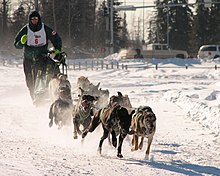
Back علم الحيوان الإنساني Arabic Антразаалогія Byelorussian Антразаалёгія BE-X-OLD Antrozoologia Catalan Antrozoologi Danish Human-Animal Studies German Antrozoolociye DIQ Ανθρωποζωολογία Greek Antrozoología Spanish Antrozooloogia Estonian

Anthrozoology, also known as human–animal studies (HAS), is the subset of ethnobiology that deals with interactions between humans and other animals. It is an interdisciplinary field that overlaps with other disciplines including anthropology, ethnology, medicine, psychology, social work, veterinary medicine, and zoology. A major focus of anthrozoologic research is the quantifying of the positive effects of human–animal relationships on either party and the study of their interactions.[1] It includes scholars from fields such as anthropology, sociology, biology, history and philosophy.[2][3][4]
Anthrozoology scholars, such as Pauleen Bennett, recognize the lack of scholarly attention given to non-human animals in the past, and to the relationships between human and non-human animals, especially in the light of the magnitude of animal representations, symbols, stories and their actual physical presence in human societies. Rather than a unified approach, the field currently consists of several methods adapted from the several participating disciplines to encompass human–nonhuman animal relationships and occasional efforts to develop sui generis methods.
- ^ Mills, Daniel S. "Anthrozoology" Archived 2016-06-03 at the Wayback Machine, The Encyclopedia of Applied Animal Behaviour and Welfare. CABI 2010, pp. 28–30.
- ^ DeMello, Margo. Teaching the Animal: Human–Animal Studies Across the Disciplines. Lantern Books, 2010, p. xi. and Hurn, Samantha. Humans and Other Animals. Pluto Press, 2012.
- ^ Animals & Society Institute. Archived June 25, 2013, at the Wayback Machine Retrieved February 23, 2011.
- ^ The term should not be confused with "animal studies", which often refers to animal testing.